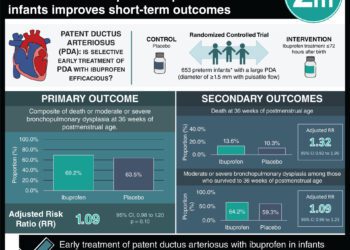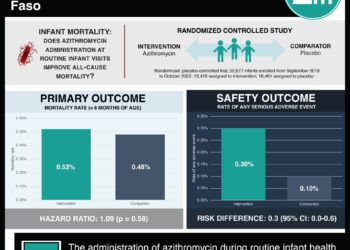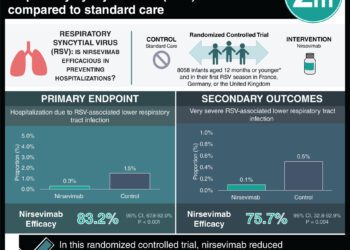Iron supplementation during infancy linked to improved motor development
1. Infants receiving supplemental iron performed better on gross motor tests at 9 months of age.
2. No significant difference in gross motor performance was observed between infants who received iron supplementation in utero and during infancy compared to those supplemented in infancy alone.
Evidence Rating Level: 1 (Excellent)
Study Rundown: Iron deficiency is one of the most prevalent nutritional disorders in the world, affecting individuals in both developing and industrialized countries. Considering the importance of this nutrient for myelination and proper oligodendrocyte development and function, one might predict that iron deficiency during fetal development and/or in infancy would impair brain development. While previous studies have suggested that iron supplementation in infancy is beneficial for gross motor development, less is known about the impact of maternal iron supplementation for the developing fetus. Authors of this study therefore assessed gross motor function at 9 months in infants who had received supplemental iron in utero, after birth, during both time periods, or neither. Results indicated that the infants who had received iron in infancy (regardless of maternal supplementation) scored better on reflex, stationary, and locomotion tests; the risk of their performance being in the lowest quartile was significantly reduced. Motor development in babies receiving iron during infancy compared to those receiving it both before and after birth was similar. Participants comprised a rather homogenous group of individuals from Hebei Province, China; thus, due to a potential impact of ethnic background and diet on iron metabolism, generalizability may be limited. However, since no adverse effects were noted, motor developmental benefits aside, clinicians around the world may wish to consider iron supplementation for pregnant women and their infants to reduce consequences of iron deficiency.
Click to read the study, published today in Pediatrics
Relevant Reading: Why iron deficiency is important in infant development
Study Author, Dr. Rosa M. Angulo-Barroso, PhD, talks to 2 Minute Medicine: California State University, Department of Kinesiology, Northridge, California.
“Effects of iron deficiency are likely to depend on when the brain architecture and circuitry for different functions mature most rapidly, that is, during gestation or infancy. Although our study found that iron supplementation during infancy benefited gross motor development despite supplementation during pregnancy, gross motor development is only one aspect of the overall development in a child. Iron deficiency during the pregnancy period may affect other developmental domains such as cognitive or socio-emotional.”
In-Depth [randomized controlled trial]: Participants in this linked randomized controlled trial included 1196 infants born to mothers with uncomplicated singleton pregnancies in rural Hebei Province, China. During pregnancy, the mothers received daily folate, with or without supplemental iron; after delivery, their babies were given either a single daily dose of supplemental iron or placebo from 6 weeks to 9 months. Gross motor development was measured using the Peabody Developmental Motor Scale, Second Edition (PDMS-2). The Infant Neurologic International Battery (INFANIB) and Behavior Rating Scale (BRS) of the Bayley Scales of Infant Development, Second Edition were also used to assess neurological integrity and motor quality, respectively. Infants randomized to the 2 groups that received iron supplementation in infancy scored significantly better on the PDMS-2 overall (P < 0.001) and also on each of the 3 subscales: reflexes, assessing autonomic reactions to environmental stimuli (P = 0.03); stationary, evaluating control of posture (P < 0.001); and locomotion, such as crawling (P < 0.001). Further, the risk of having a locomotion subscale score below the 25th percentile was reduced by 36% in the groups that received iron in infancy compared to those that did not (relative risk: 0.64; 95% confidence interval: 0.52-0.80). Although reducing the sample prevalence of maternal iron deficiency, iron supplementation prior to birth did not significantly improve overall gross motor development at 9 months as assessed by the PDMS-2.
Image: CC
©2015 2 Minute Medicine, Inc. All rights reserved. No works may be reproduced without expressed written consent from 2 Minute Medicine, Inc. Inquire about licensing here. No article should be construed as medical advice and is not intended as such by the authors or by 2 Minute Medicine, Inc.









